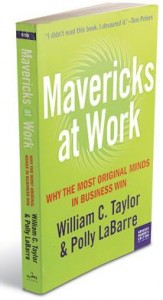“If you do things the way everybody else does them, why do you think you’re going to do any better?”
Originality. This was the centerpiece of the Purple Cow and really, this is the key element to becoming a maverick.
The  maverick pushes how to differentiate himself from the competition in smart, strategic ways. This isn’t a unique concept, but the idea is simple. If you’re original, and the idea does not work, it may go unnoticed or you may get made fun of. If the idea works and is efficient, others follow and you are a genius. The key here is not to deliver, but to try. If you don’t have the courage to try; you don’t have the courage to succeed.
maverick pushes how to differentiate himself from the competition in smart, strategic ways. This isn’t a unique concept, but the idea is simple. If you’re original, and the idea does not work, it may go unnoticed or you may get made fun of. If the idea works and is efficient, others follow and you are a genius. The key here is not to deliver, but to try. If you don’t have the courage to try; you don’t have the courage to succeed.
Competition can help make you grow as we. Compete one-on-one; compete against another company; compete against your own objectives – the more the competition, the potentially better product (you) because of what’s at stake… pride.
Passion always will be in the driver’s seat. This feeling drives a person for better work; it makes you stay late and wake up early. Passion drives you to what others would call work each day. I have no passion to do the dishes, but I do have passion to conceptualize a mobile app.
No matter how much passion you have, you should also retain humbleness for the unknown. Don’t assume; don’t be a know-it-all; and keep learning. The most effective leaders are the ones who are the most insatiable learners.
Simple is difficult. But always keep it simple as possible. And you don’t sell a product; you sell an experience. Starbucks makes millions over cheaper priced stores because they sell experience, not just coffee. Be unique in your story; be simple in your delivery.
Social Media works. Reach out to your contacts on a personal level, and they respond. They talk about you and how they personally feel. This affects their network, which builds a quasi-trust with your brand. Invest in social and your customers feel connected with you. This builds loyalty. Then build the product.
The book then turns into the investment of people. Of not hiring separate stars, but hiring teammates that build the products whose the star. David Roberts didn’t win the 2004 World Series for the Sox. No, his team put him in the position to be an all-star and he delivered. The Red Sox then won the series. And it goes to the question of “why would great people join your organization” in the first place? Is it the exciting projects? Is it the culture? Or is it just a job.
Those were some of the main points. Overall, the book was good, but I don’t know if Rob missed it too much over the past few months from his bookshelf.
